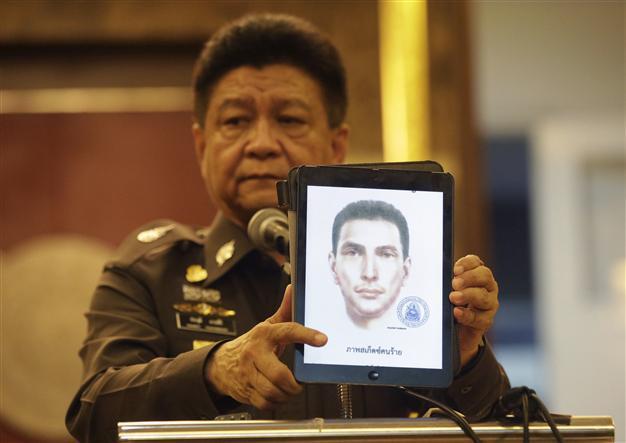Blast suspect's prints found on bomb equipment: Thai police
BANGKOK - Agence France-Presse

AP photo
The fingerprints of a foreign man arrested over last month's deadly Bangkok blast match those found on bomb-making equipment discovered at a flat over the weekend, Thai police said Sept. 2.Investigators say the unidentified man was detained on Sept. 1 while trying to cross into Cambodia in a remote and rural border area.
He is the second foreigner held over the August 17 blast at a religious shrine which killed 20 people, mostly ethnic Chinese tourists.
Police are narrowing their search for those behind the bomb, the worst-ever such attack on Thailand.
National police spokesman Prawut Thavornsiri told reporters the man's fingerprints were found "on a bottle containing bomb materials found in a room" in the Bangkok suburb of Nong Chok.
"We can confirm that this man is directly involved with the bomb material," he added.
Police raided a flat in Nong Chok, a suburb on the eastern outskirts of Bangkok, on Aug. 29.
They arrested another foreign man in possession of bomb-making paraphernalia and dozens of fake Turkish passports.
Both are now in military custody.
Police have refused to confirm the two men's nationalities. They believe both used fake identity documents and are liasing with embassies to ascertain their true nationalities.
But on Sept. 2 a senior officer said the man arrested on Sept. 1 was talking to interrogators through an interpreter.
"He speaks Turkey's language," incoming Thai police chief General Chaktip Chaijinda told reporters, without specifying whether the language was Turkish or part of the wider Turkic family.
Thai media have circulated a picture of a Chinese passport that they say was found on the man at the time of the arrest on the Cambodian border.
The passport gives the man's name as Yusufu Mieraili and his birthplace as Xinjiang.
The vast far-western region of China is home to the country's Uighurs, a Turkic language-speaking Muslim minority whom rights groups say are repressed by the authorities.
Asked whether the detainee was a Uighur, Chaktip replied: "The passport says so. But we have to wait for confirmation."
Some have speculated that the attack on the Erawan shrine, which is hugely popular with ethnic Chinese devotees, could have been in revenge for Thailand's recent deportation of more than 100 Uighur refugees back to an uncertain fate in China.
Police have rejected such a motive. Chaktip said the man was insisting on his innocence during his interrogation.
The Chinese embassy did not pick up calls requesting comment.
The Turkish embassy has also not responded to AFP requests for comment.
Arrest warrants have also been issued for seven others, only one of whom -- a Thai Muslim woman -- has been identified. Earlier this week she told AFP she is currently in Turkey but denied involvement.
















